
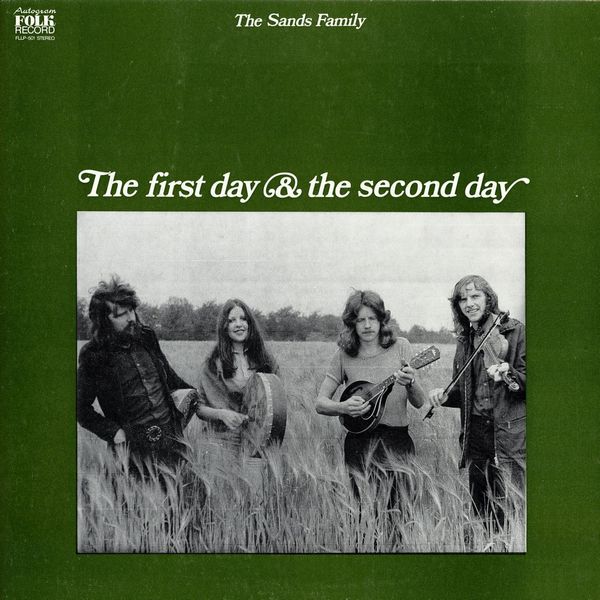 |
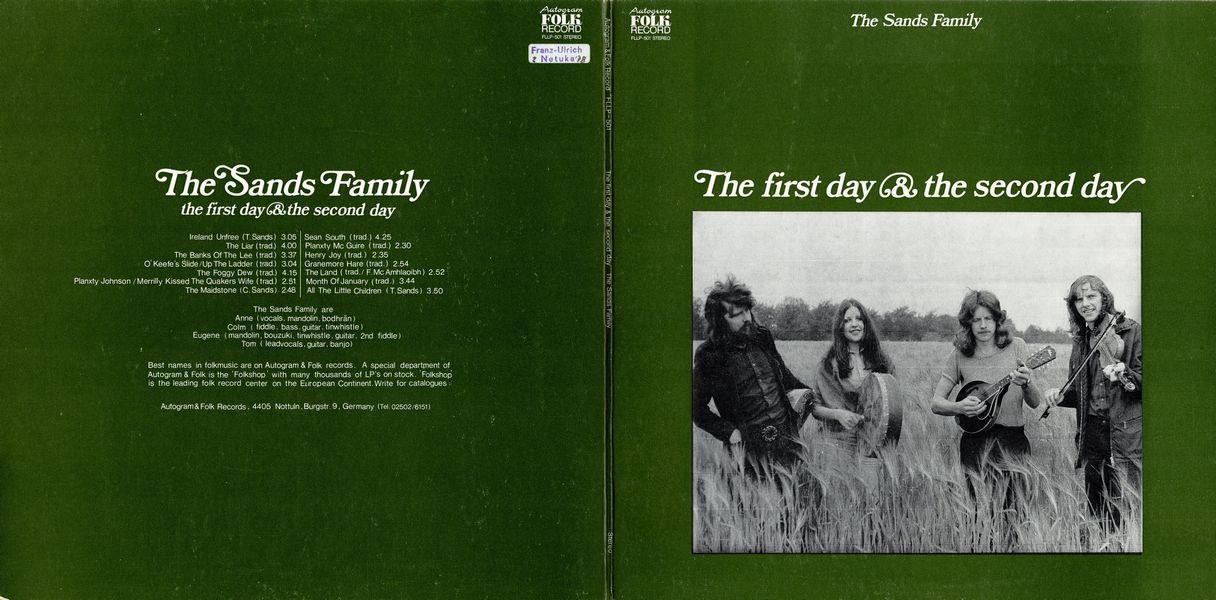
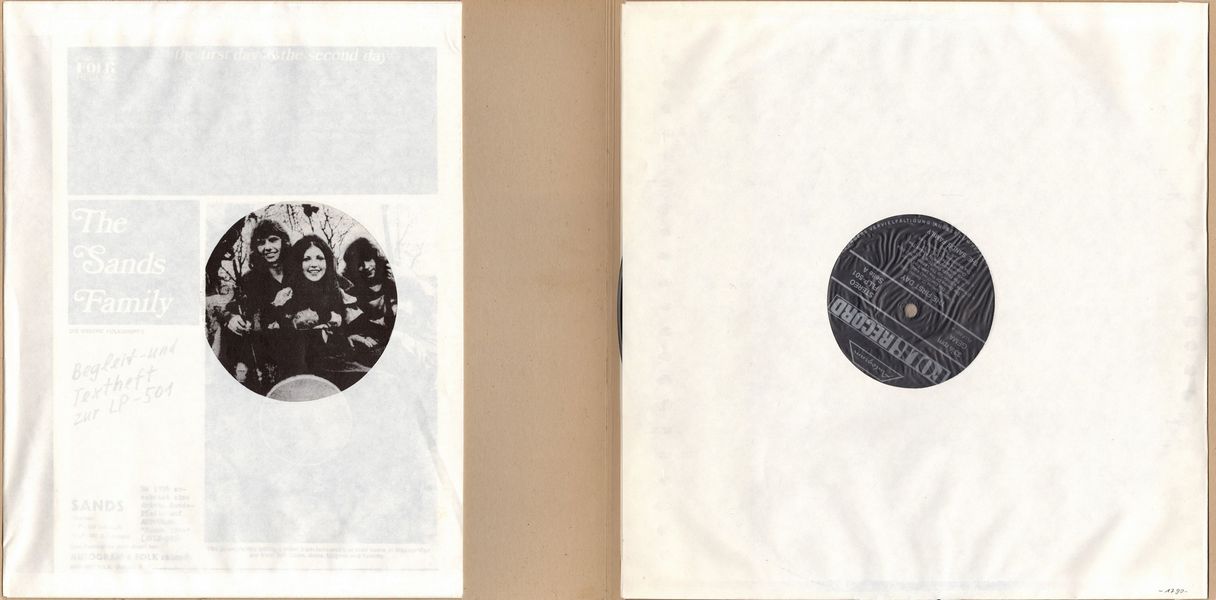
|
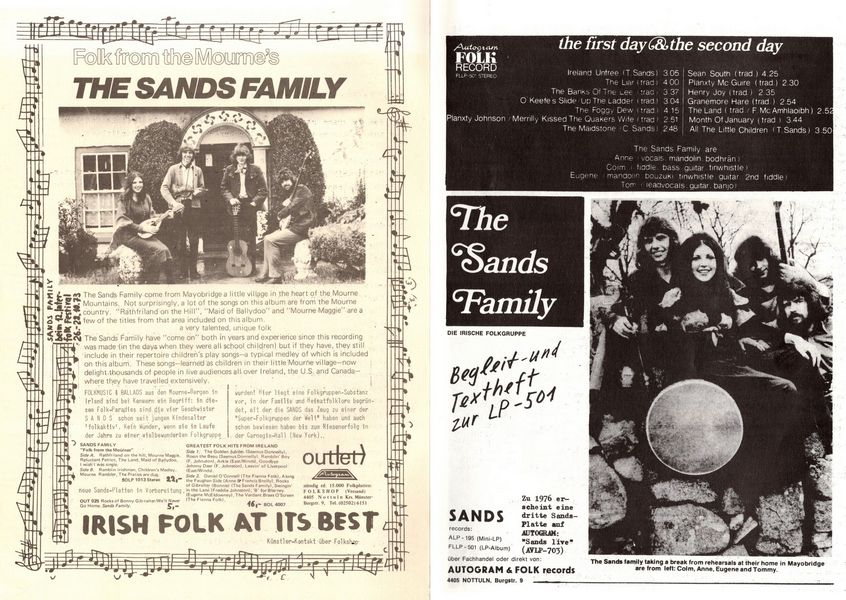
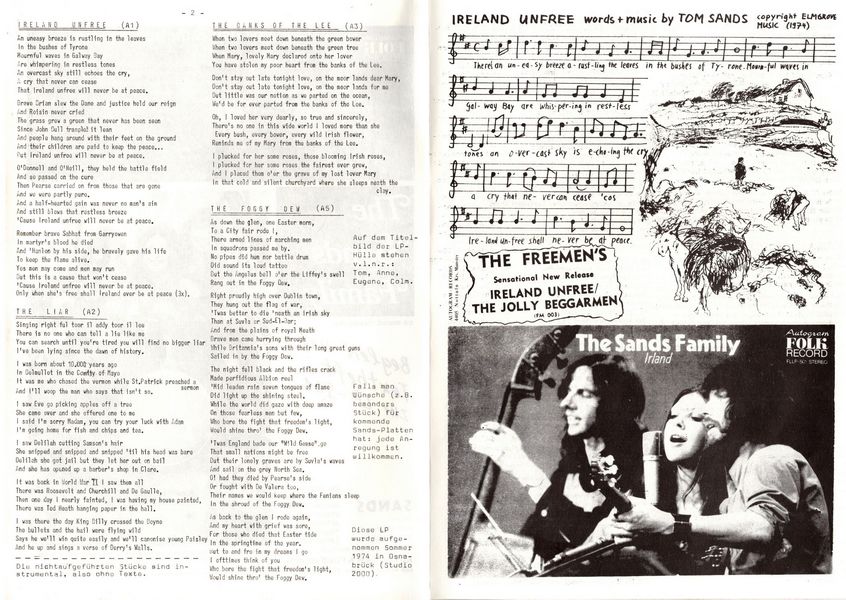
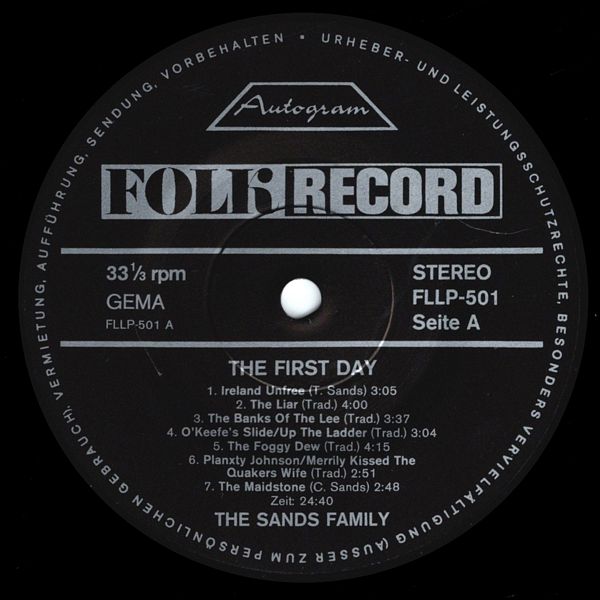
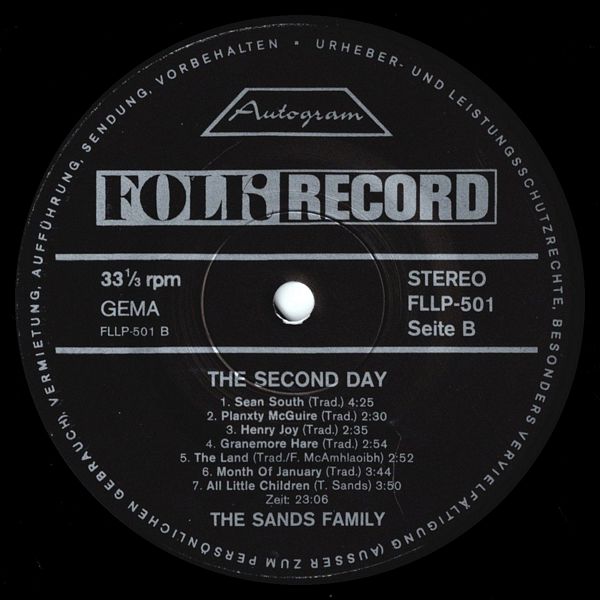
|
| more images |
Sleeve Notes
The titles and their authors:
The back cover or front page of this issue provides information about this. Anything with "trad." is traditional Irish folk music, which the Sands have simply rearranged, retaining as much of the traditional character as possible within the framework of the "group sound". Three of my own pieces are on the LP: "Ireland Unfree" (music & lyrics by TOM Sands), also "All The Little Children"; "The Maidstone" is by COLM Sands (also lyrics & music). The track 85) is in the second part by Ferghal McAmhlaoibh, Friend of Tom's since their college days together.
The age order of the Sands is likely to be of interest to the adjacent quiz and general interest: The oldest is Tom, followed by Benny, Colm, Eugene and Ann.
Benny 'reamateurized' after his marriage and can only occasionally be heard at gigs in Ireland as the fifth member: he plays fiddle, tin whistle and guitar, and occasionally writes pieces like "Good Bye Joe" on the Interfolk Festival LP (AUTOGRAM ALLP-187), and at home he also has a piano not only for further musical pastime but also for arranging and working out the score (see, for example, the two sheet music contributions in the booklet). ' And while we're on the subject of family relationships: Papa Sand's name is Michael (plays the fiddle), Mama's name is Bridie (plays the accordion); unmentioned eldest siblings: Mary (sings Gaelic songs) and Hughie (lives in Canada) with guitar and vocals.
Bodhran is a hand drum measuring approx. 40cm in diameter, covered on one side with siskin skin, which is mostly made by Irish Tinkers (gypsy-like population). That's why Irish small farmers like the Sands tend to collect their goats as soon as tinkers are reported in the area. And who knows, maybe the Sands have just recovered part of their own goat in the form of a bodhran (they have several different diameters)? (while the meat went into the Tinker pot … ). In fact, this is how goats were stolen from the Sands …
Bouzouki is a Greek mandolin instrument that is very common in Ireland. It sounds more penetrating than all other types of mandolin and is therefore popular at concerts and also (not on this record) as a counterpoint to the banjo. The tuning of the eight-string bouzouki is (in contrast to the mandolin EADG): DADG, i.e. one octave lower than the mandolin. And the neck is significantly longer.
Guitars: Everyone plays a 12-string guitar on the A-side "First Day", a 6-string guitar on the B-side ("Second Day") — There are two reasons why not all of the instruments that the Sands play can be heard on this LP : This LP should have a sound that is not too distorted; and the Sands had come by plane anyway and couldn't bring all their musical luggage with them (after all, there are other Sands records too). And here is the main one.
Some internal information we would have liked to have included a map of the Morne Mountains in southeast Ulster with the location of the Sands Cottage, but for 'tourist' reasons this has to be omitted: popularity of the Sands; But Ireland folk tourists, be considerate of the family, because they cannot receive visitors from Germany (and many other countries) every day or hour. And anyway, the Sands as such are on tour somewhere most of the time and therefore not at home; and when they are at home, they also need time to relax, practice and write, drive in the hay, etc.
Explanations about the pieces on this record:
Ireland Unfree — A few years before the well-known Irish uprising of 1916, the old patriot and Fenian (Irish Republican Brotherhood in America — forerunner of the IRA) O'Donovan Rossa was buried in Irish native soil. The Irish poet and spiritual leader of the time ('there must be a bloodbath to liberate Ireland') Padraic Pearse said in the eulogy addressed to England: 'The idiots, the idiots, these damned idiots, they left us our slain Fenians*, with Ireland tending their graves, and an unfree Ireland will never be able to live in peace.' These thoughts have dominated Irish history for 800 years, and all Irish rebellions against "John Bull" (=England) have taken place for 50 years, and again in recent years.
* O'Donovan Rossa was killed in conspiratorial Irish operations in the USA. "Fenier" = German translation of The Fenians.
The Liar — There are an extraordinary number of versions of this song. The Sands have mixed together parts of the version made famous by Tommy Makern and their own. In these song verses, the authors can let many imaginations run wild, as we did in the carnival booth, and even include political innuendo — like the Sands here — without running the risk … you end up classifying yourself as a liar.
The Banks Of The River Lee — A love song, a young man's lament for the death of his lover. The Sands learned this song from Peggy Ryan from Rathmurroe.
O'Keefe's Slide & Up The Ladder — These are two set dances from County Limerick. A similar musical family like the Sands comes from there, "The Ryan Family". They occasionally have friendly meetings and exchange repertoire. This is how typical southern dances (related to Ireland) found their way into the north and vice versa.
The Foggy Dew — This Rebel song comes in different versions. This text is based on the military rebellion of 1916 in Dublin. The melody, as is usually the case with such songs, is old folklore, yes, the original "Foggy Dew" is a love song. This 'heroic' "Foggy Dew* is also known as the "Easter Rebellion Song" and is common knowledge to all freedom-loving Irish people not only in Ireland but also in America.
Planxty Johnson & Merrily Kissed The Quaker's Wife — The first melody is originally a harp melody. And 'planxty' in the title is an old Irish term that means 'dedication', so here a dedication to Johnson. Implementing old harp melodies is now quite popular among Irish folk groups. The Sands took over the second melody, a 'slide' dance, from the aforementioned Ryan Family.
The Maidstone — "Maidstone" is the name of the prison ship in Belfast Bay. It is considered one of the safest prisons in Europe. Nevertheless, in January 1972, seven IRA men escaped thanks to a complicated strategy and bypassing the mines. The final verse is a bit prophetic, because Ted Heath's yacht sank in 1974, and he also had the 'icy shock' in 1975 when he was replaced as the Tory party leader — by a woman. This song reveals a bit of the humor that Colm (who despises cigarettes and alcohol in even the slightest form) carries with him.
Sean South — This song — written anonymously based on an old ballad melody — deals with an incident from 1956, i.e. in a relatively quiet time when sensitive, patriotic Irish people in Northern Ireland struck here and there: a still living relative told the Sands: "Sean left our house one morning with a game bag, we didn't know where he was going, it was the last time we saw him alive." He was killed along with his friend Ferghal OHanlon when they carried out an attack on a British barracks in Fermanagh.
Planxty McGuire — This is a composition by the famous harpist O'Carolan (1670-1738), which he wrote as a hymn to the wealthy McGuire family of County Fermanagh. The Sands learned the melody from an old 78 rpm shellac record (yes, in Ireland there was folk music on records from the beginning).
Henry Joy — Henry Joy McCracken was a popular leader of the United Irishmen. In 1798 the Protestants cracked down again. Henry Joy was arrested and executed. This heroic song has survived to this day.
Granemore Hare — This is a hunting song from County Armagh. A "puss", the local term for a hare's tail, is here as the name for a whole hare.
The Land — The Dublin fiddler Ferghal McAmhladhib (English: McAucliffe) regularly visits the Sands at home in the Morne Mountains and of course always brings his fiddle with him. Five years ago they played the traditional melody together (part 1); In the year before this recording he decided that the melody would be suitable for a second part composed by him (the earlier Sands recording on the outlet LP is therefore without this part).
The Month Of January — Like the ballad 'Banks Of The Lee', this song mixes love and sadness. A young girl is rejected first by her lover and then by her parents. After these experiences, she gives the well-known warning in the last verse. The Sands learned the song from the elderly Sarah Makem, mother of Tommy Makem, from Keady in County Armagh, Northern Ireland.
All The Little Children — This is a different recording than the same Sands song on their AUTOGRAM mini-LP (item no. ALP-195); the 2nd verse is also changed. This song once again features the poet and singer Tom Sands, who in the song bears beautiful witness to the longing for peace. It is now one of the most recorded and sung new civil rights songs in Northern Ireland. Only on the radio is this song boycotted there, as well as other committed songs by the Sands Family. When recording in Ireland they refused to change the lyrics.